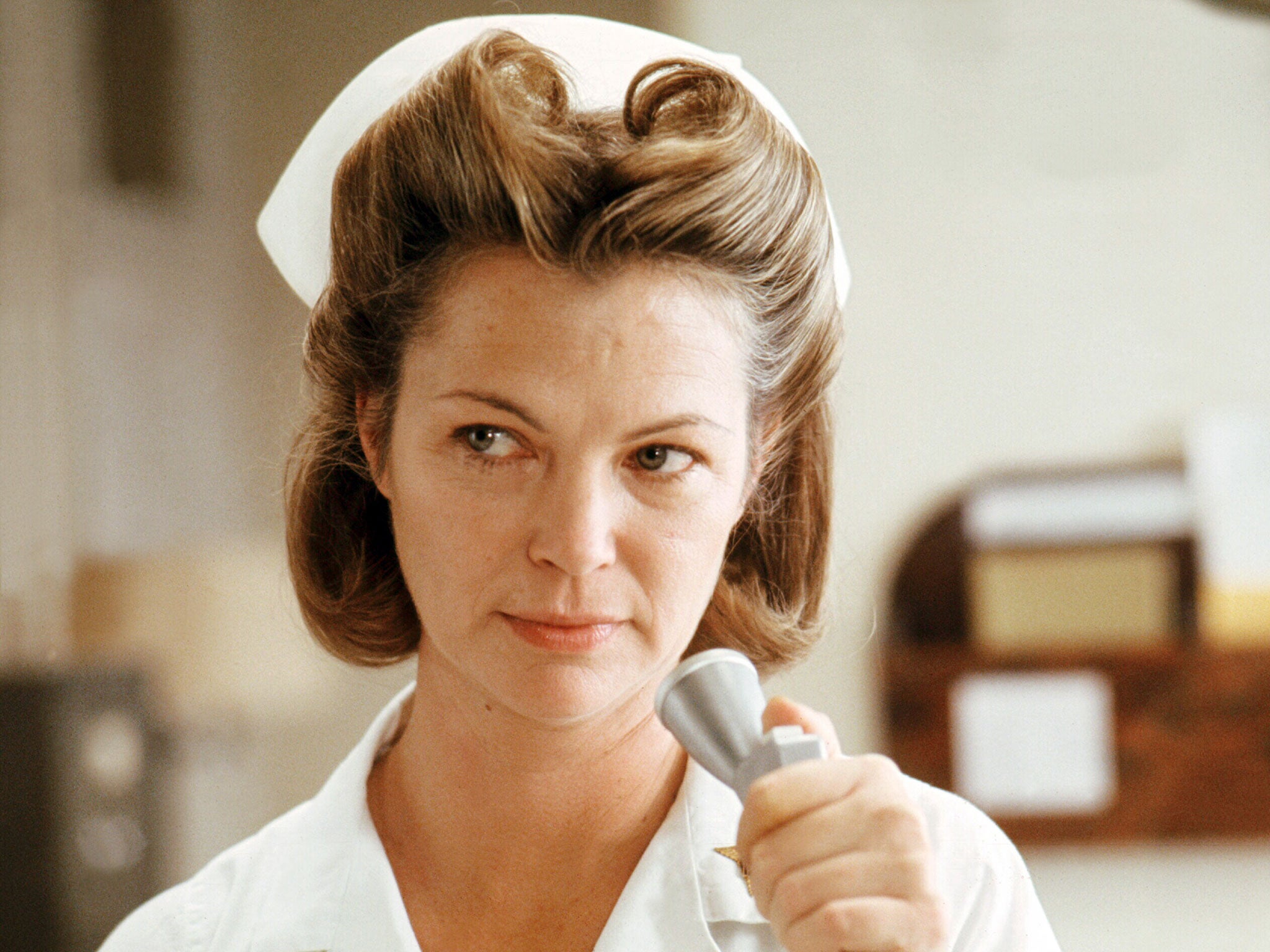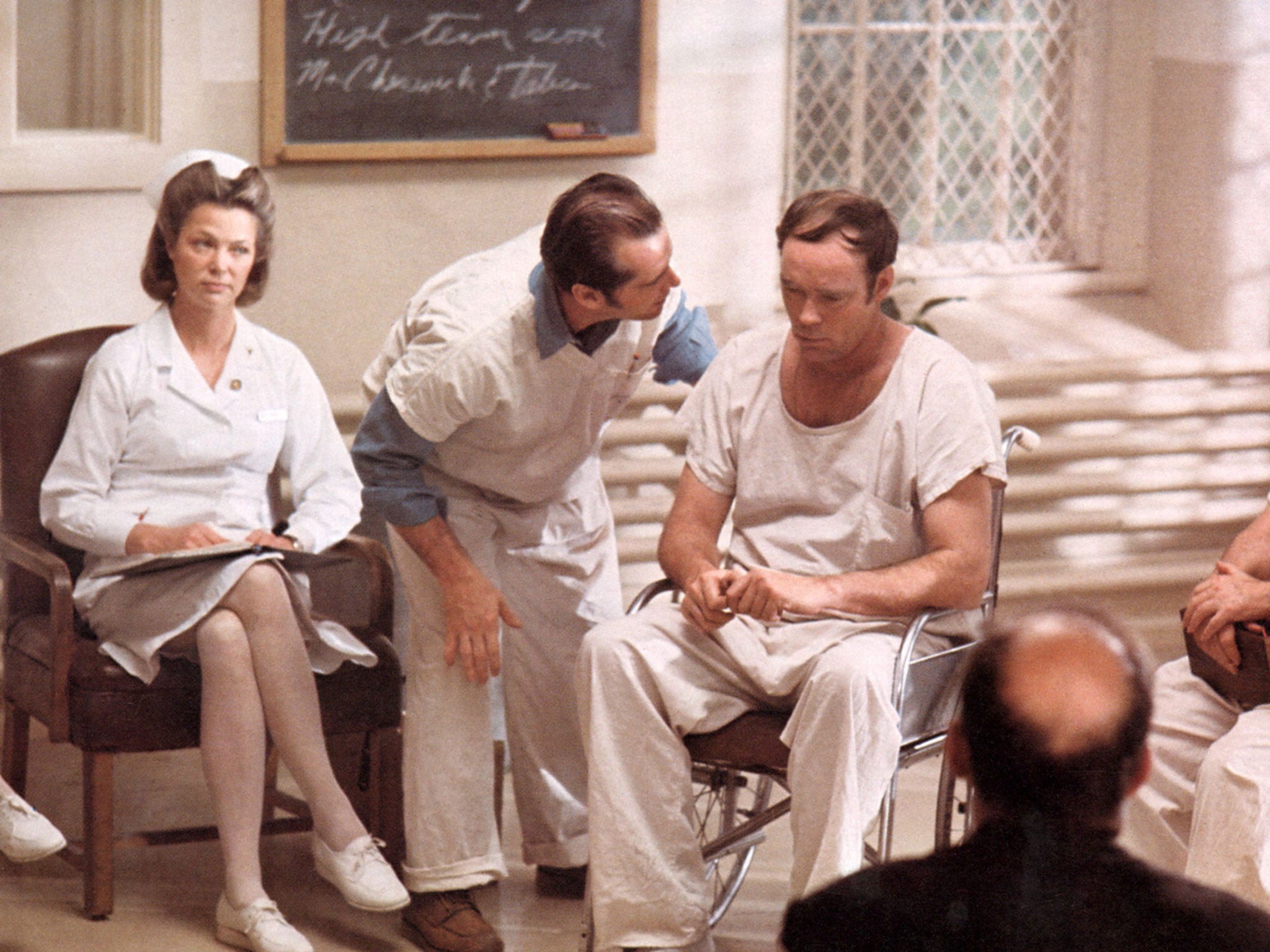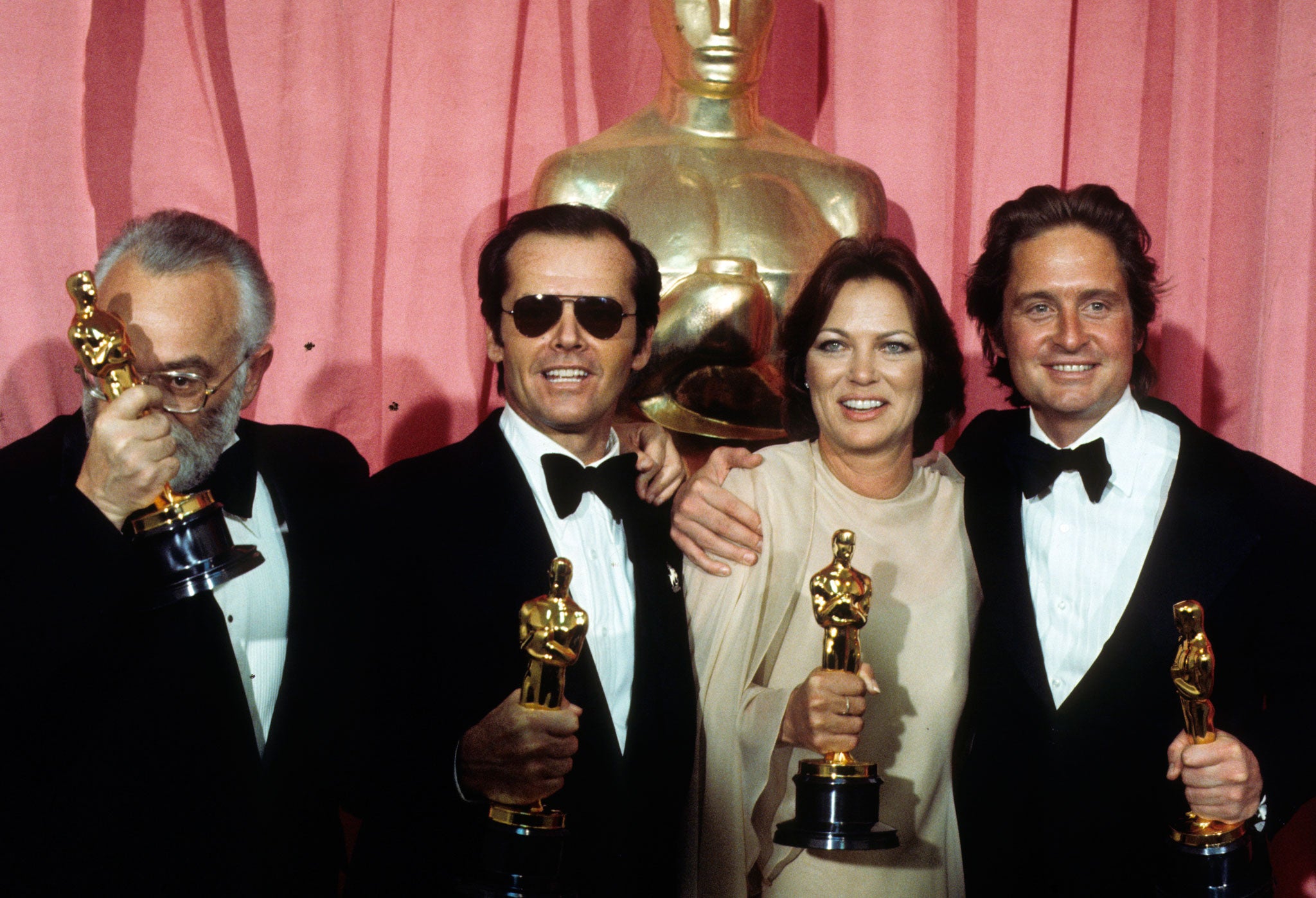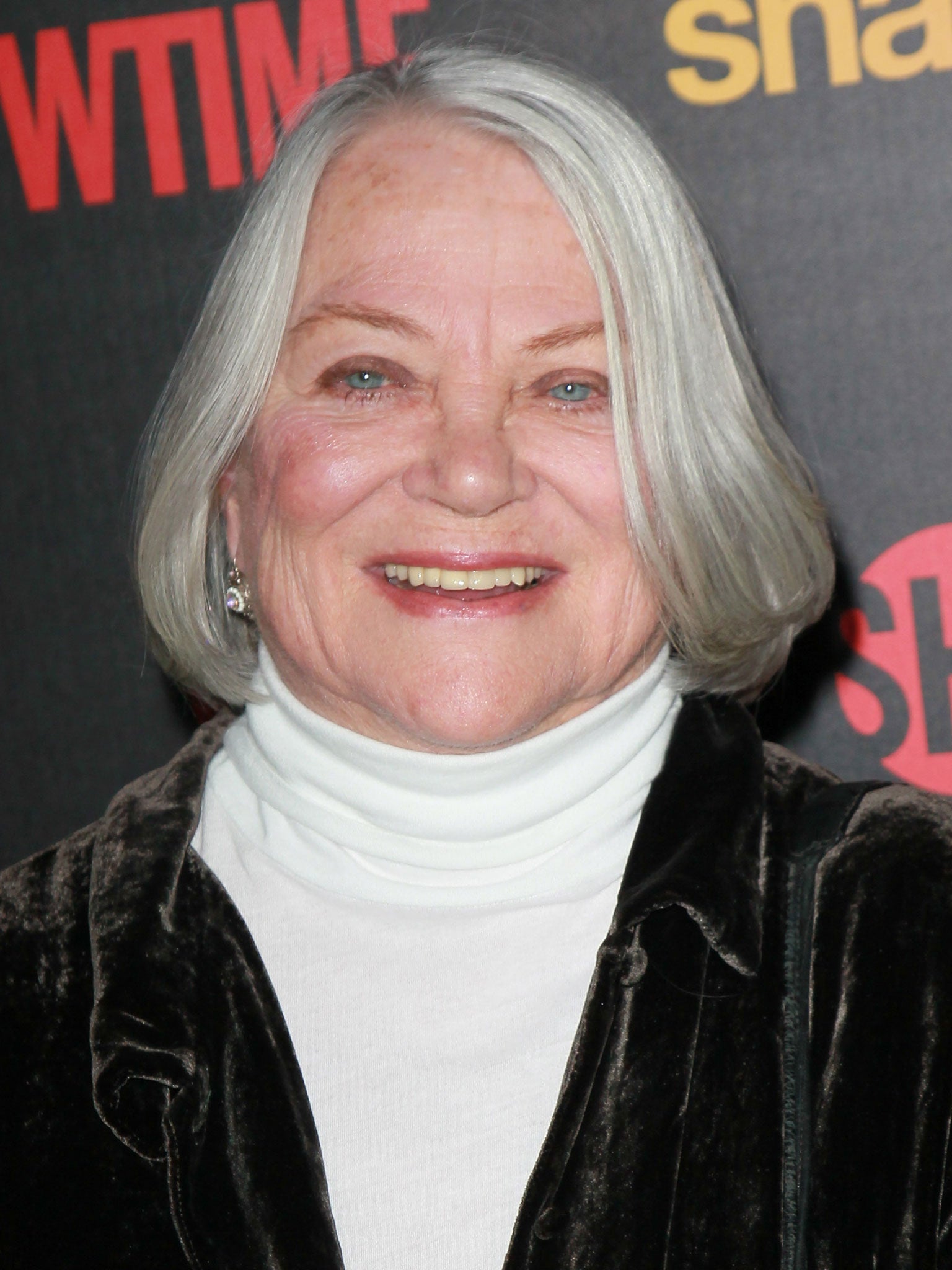One Flew Over the Cuckoo's Nest: Louise Fletcher recalls the impact of landing the Oscar-winning role of Nurse Ratched
It was 40 years ago that Louise Fletcher came from nowhere to win the Best Actress Oscar for her portrayal of the terrifying Nurse Ratched in ‘One Flew Over the Cuckoo’s Nest’. How did she do it? And what’s happened to her since? Tim Walker visited her at her home in Los Angeles to find out

Louise Fletcher never played another role as remarkable as the one for which she won an Oscar in 1976: Nurse Ratched, the chillingly prim psychiatric ward administrator of One Flew Over the Cuckoo's Nest. In the 40 years since that triumphant evening at the Dorothy Chandler Pavilion in Los Angeles, she has been cited frequently as an example of Oscar's Curse, the arc of career misfortune said to afflict some Academy Award-winners.
The Best Actress honour roll for the rest of the 1970s consists exclusively of big names: Glenda Jackson, Faye Dunaway, Jane Fonda, Ellen Burstyn, Diane Keaton. But Fletcher was little known previously, and has been rarely prominent since.
A player of modest TV bit-parts in her twenties who spent her thirties concentrating on bringing up her children, at 41 she was of unusually advanced years to be a first-time Oscar contender – and arguably too late to capitalise on the victory. Hollywood, to its shame, has little use for middle-aged women. This, you might think, was her one brief shining moment.
And yet, from another angle, Fletcher's trajectory looks somewhat different. After quitting show business to raise a family more than a decade before the casting of Cuckoo's Nest, she was plucked from retirement by not one, but two of the era's most celebrated filmmakers. And then, having delivered an indelible performance as Nurse Ratched – ranked by the American Film Institute as one of the five greatest screen villains of all time – she also delivered an Oscar acceptance speech for the ages.
The characters of Cuckoo's Nest first flew off the pages of Ken Kesey's countercultural novel in 1963, when Kirk Douglas starred in a Broadway stage adaptation as Randle McMurphy, the felon who fakes insanity to avoid a prison sentence and fetches up instead at an Oregon psychiatric hospital. McMurphy, an unstoppable force, meets an immovable object in the form of Nurse Ratched, with whom he struggles in vain for the souls of his fellow patients.
Eager to make Cuckoo's Nest into a movie, Douglas agreed to send a copy of the novel to the Czech director Miloš Forman. But the book was confiscated by Czech customs, unbeknownst to both men, who each thought the other had failed to honour their agreement. Ten years passed before Douglas's son Michael coaxed Forman back to the project, by which time Douglas Sr was too old to play McMurphy, the part that would earn Jack Nicholson a fifth Oscar nomination – and his first win.
Fletcher had given up acting in 1962, the year Kesey's novel was published and her second son was born. Her husband Jerry Bick was a producer, but she assumed her career was over – until 1973, when Bick was working on Robert Altman's new film, Thieves Like Us, and the director asked to cast Fletcher in a key supporting role. She was reluctant, worried it would look like nepotism, but Altman persisted. "I really didn't want to be in it," she says. "But it turned out to be a good thing."
Now 81, Fletcher lives alone in the same well-appointed West LA apartment that Bick bought while she was shooting Cuckoo's Nest in Oregon in early 1975. "I would never have chosen this place myself," she admits, as she brews Nespresso coffee on a cool December morning. "There's not enough light." Tall for an actress, at 5'10", she still carries herself with the same poise that must have recommended her for the role of Nurse Ratched.
After Thieves Like Us, she had caught the acting bug again, but by then, she says, "I was already past the age of being a romantic lead. Pretty soon I'd be to too old to play young and too young to play old." More than a dozen Hollywood talent agents had declined to represent her by the time Forman saw an early screening of Altman's film.
Forman was watching Thieves Like Us to see Shelley Duvall, whom he was considering for another part in Cuckoo's Nest. But it was Fletcher who caught his eye. A mutual acquaintance, the casting director Fred Roos, had already mentioned her name as a possibility. Forman had always imagined Nurse Ratched as "the personification of evil", but as he pictured Fletcher in the role, he said later, "I slowly started to realise that it would be much more powerful if she doesn't know that she's evil. She, as a matter of fact, believes that she's helping people."

It took him a while to come around to the idea. Fletcher recalls auditioning for Forman several times while the part was still being offered to big names such as Fonda, Burstyn, Anne Bancroft and Angela Lansbury. "He rejected me over and over and over," she says. "At the end of every meeting he'd tell me: 'Go home and forget about this, you're not getting it.' I didn't know they were offering it to all these other actresses, who were turning it down."
Her final audition was late in 1974, with Forman and the film's producers, Saul Zaentz and Michael Douglas, the latter still on board despite his father's absence. The day after Christmas, her agent called to say she was expected at the Oregon State Hospital in Salem on 4 January to begin rehearsals. Though the film takes a dim view of his profession, the hospital's superintendent had offered up his facility as its main location, and even agreed to appear on screen, playing a doctor.
The movie's budget was a modest $4m, financed personally by Zaentz, who had borrowed against his company. Forman had assembled a formidable cast of young character actors to play the other patients, including Danny DeVito, Brad Dourif and Christopher Lloyd. But while Nicholson's salary was "enormous", laughs Fletcher, "the rest of us were working for scale, or a little above that. I worked for 11 weeks and made $10,000 before taxes."
The cast and crew were billeted at a local motel, where the evenings often turned wild. Fletcher, though, feared getting too friendly with the other actors, in case the sentiment seeped into her performance. "The temptation was great to go out for dinner, to get a drink. But I knew that would be bad for me, so I made up a story that I was being harassed by a stranger and had to get out of there. The producers rented me my own little condo apartment. I desperately wanted to be on my own, to have the separation that I thought was so important for the role."
A keen observer of politics, Fletcher keeps a postcard of Barack Obama on the pin-board in her home office, not far from her Oscar statuette, her Bafta and her family photos. To her delight, the President has said that Cuckoo's Nest is one of his favourite films. In early 1975, a mere few months after Nixon's resignation, the scandal of Watergate was still fresh in Americans' minds, and the actress saw Nurse Ratched as an embodiment of the idea that power corrupts.
"She was convinced that she had her world in order, and that for it to work properly it had to be in that order," Fletcher says of her character. "The minute McMurphy arrived, things began to fall apart for her. And she couldn't have that. She had enough power that her conviction could have consequences – and that's where I felt we were in the world at the time, too. The film was all about who has the power and how they use it, and how absolute power absolutely corrupts."
Nicholson, fresh from a string of classics including Easy Rider, Five Easy Pieces and Chinatown, was already one of the biggest stars in the world, but he and Fletcher had met each other some 15 years earlier, when both were unknowns taking classes from Jeff Corey, a blacklisted performer who became a sought-after acting teacher. On Cuckoo's Nest, Nicholson helped Fletcher to overcome her nerves. During a panicky moment on the first day of the shoot, she says, "Jack started making faces and picking his nose to distract me and help me to relax."

In fact, Nicholson's on-set antics positively enhanced her performance. "After a few days on set, Jack said to me: 'Jesus, we don't know a thing about this Ratched woman. What's her given name?' And I said, 'Only I know what her name is.' But he pressed, so I told him that it was Mildred. A few weeks later, when McMurphy comes back from electric shock therapy and he's screwing around with the guys, pretending to be a zombie, he turns and he says: 'Hello, Mildred.' And I blushed; you can see me changing colour on camera. It was wonderful."
In what may be the film's most stirring scene, McMurphy almost strangles his tormentor to death. "Jack made shooting that scene a lot of fun," Fletcher says. "He said he didn't want to hurt me, 'So we're gonna do the Yiddish school of acting: you try to make me choke you, and I try not to choke you, and it looks the same.' It was brilliant – and that was the only physical thing I got to do in the movie, so I kept asking him to practise. He got bored of it in the end!"
During the world premiere of One Flew over the Cuckoo's Nest in Chicago on 19 November 1975, the audience stood and cheered at the strangling sequence. "That blew me away," the actress says now. "It was very exciting. And when the film was over, people ran after us as we went up the aisle. That was the first time I had experienced that kind of attention."
Born to deaf parents in Birmingham, Alabama in July 1934, Fletcher was the second of four hearing siblings. Her mother Estelle was born deaf, but her father Robert had been struck by lightning and lost his hearing when he was four. An Episcopal minister, he founded 40 churches for the deaf in Alabama and spent much of his time on the road, preaching to deaf congregations. In her first term at a local primary school, the prohibitively shy Fletcher barely spoke. "A teacher came to our house and told my father I ought to go to the school for the deaf in Talladega. They thought I was deaf."
When she was three, Fletcher was sent to Texas for a year, to live with her mother's sister and her namesake, Louise, whom she and her siblings knew as Aunt Beezie. Her parents had asked Beezie to > teach the young Louise to speak – but she also taught her to perform. "She had no children, so she doted on us all," Fletcher says. "She was very theatrical and musical, and she would dress us up and we'd sing and dance and do plays and get a lot of attention, a lot of approval. She taught me how to show off. I just loved getting applause."
After graduating from the University of North Carolina in 1957, Fletcher intended to become a theatre actress in New York. But after a cross-country road trip with her roommates, she ran out of money in LA and started auditioning for screen roles instead. Her parents "were always supportive", she says. "I could have been a murderer and they would have supported me. My father was an Episcopal minister, but when I married a Jewish man he didn't blink an eye. He was a beautiful man."
During the first phase of her career, Fletcher appeared in supporting roles on several classic TV shows including Maverick and Perry Mason. She married Bick in 1960 and the couple had two sons, John and Andrew. (They would divorce in 1977, but remained close until Bick's death in 2004.)
In the 1960s, the family spent six years in London, where they mingled with some of the capital's most swinging residents. "I almost got arrested with Vanessa [Redgrave], picketing against the Vietnam War in Berkeley Square," Fletcher recalls. The actresses would later work together on Second Serve, a 1986 TV movie about the transgender tennis player Renée Richards. "I played her mother," says Fletcher. "I know, we're the same age – but this is Hollywood." Fletcher and Bick's house on Old Church Street in Chelsea was next-door to the shoe shop where designer Manolo Blahnik worked at the time. Years later, Fletcher ran into Blahnik – also a friend of Nicholson's – at a party to promote Cuckoo's Nest. "He said to me: 'Aren't you Mrs Bick?'"
Contrary to the "Curse of Oscar" theories, Fletcher has worked consistently ever since Cuckoo's Nest. The one regret she acknowledges is turning down the role of Carrie's mother in Brian de Palma's Carrie the following year. Instead she made Exorcist II: The Heretic, which nowadays is often listed as one of the worst films ever made. "I was offered a lot of villains after Nurse Ratched," she says, "and I played a lot of them, because you have to work."
During the 1990s she had a regular gig as a Machiavellian religious leader in the Star Trek series Deep Space Nine, the part for which she still receives the most fan-mail, Cuckoo's Nest notwithstanding. More recently, she has appeared as Frank Gallagher's foul-mouthed, deadbeat mother in the US version of Shameless. When audiences first met Peggy "Grammy" Gallagher, she was serving a prison sentence for a meth lab explosion that killed two people.
Both Fletcher's sons toyed with the thought of acting, she says. "When young people ask me for advice, I tell them: 'Only become an actor if you absolutely have to, because it means eating rejection almost every day of your life'. Even if you're successful, it's a steady diet of rejection. Once you learn how not to take that personally, you can survive it. But it used to kill me in my twenties."
By her forties, she was more prepared for rejection than she was for acclaim. In her review of Cuckoo's Nest, the revered New Yorker critic Pauline Kael described Fletcher's performance as "masterly", writing: "Changes in her flesh tone tell us what Nurse Ratched feels. We can see the virginal expectancy – the purity – that has turned into puffy-eyed self-righteousness. She thinks she's doing good for people, and she's hurt – she feels abused – if her authority is questioned."
The film was not just a critical success, it was also the year's third biggest box office hit, behind only Jaws and Rocky Horror. Fletcher was soon swept up in the rush of awards season; even 40 years ago, Oscar campaigns were an ordeal. "I thought my husband might shoot himself, or shoot me," she says. "I had been my family's chief laundress and bottle washer, so they were all pissed off at me because I wasn't paying them the same attention they were used to."
A week before the Oscars in March 1976, Fletcher and Bick escaped to a beach in Baja, and it was there that she began to write her acceptance speech. The bookies' favourite, she was still convinced she couldn't win. "I thought Glenda Jackson would win [for Hedda], because who was I? Nobody really knew me. I'd had a little TV career that I'd given up. But Jerry said, 'You'd better think of a speech, because you don't want to be up there without anything to say'."

The speech, enshrined on YouTube, is an antidote to awards- season cynicism that anyone with Leo-fatigue ought to seek out. It is concise – a rarity. It contains a brace of jokes, both witty and heartfelt, and an emotional climax as worthy of an ovation as that strangulation scene. On a stage where performers are often suspected of insincerity, Fletcher's joy is authentic and very moving.
That night, Cuckoo's Nest would take all five major Academy Awards – Best Picture, Director, Actor, Actress and Screenplay – the first film to do so since 1934's It Happened One Night. Only one other film, The Silence of the Lambs (1991), has matched the feat since. Fletcher had daydreamed of winning an Oscar since childhood, and when Charles Bronson read out her name, she all but sprinted to the podium in excitement. Then she took a breath, collected herself, and began:
"Well, it looks like you all hated me so much that you've given me this award for it, and I'm loving every minute of it. And all I can say is I've loved being hated by you. I'd like to thank Fred Roos for remembering me, Milos Forman for choosing me, Michael Douglas and Saul Zaentz for taking a chance and giving me a chance, and Jack Nicholson and a cast of actors whose professionalism, humour and capacity for getting into their roles made being in a mental institution like being in a mental institution..."
Bick had fed her the line about the mental institution, she says. But what followed came straight from the heart. Many in the audience must have wondered what was happening as, in a first for the Oscars, she moved into sign language in order to communicate directly with her parents.
An ABC News crew had been dispatched to Robert and Estelle Fletcher's home in Alabama, to capture their reaction should their daughter win. Fletcher kept a copy of the footage. "They were sitting on the sofa, surrounded by friends. When I won, my mother rocked back in triumph, and my father looked at my mother. He was so crazy about her."
Remembering it now, Fletcher grows emotional: "I miss them so much," she says. "They were a great inspiration." They are the same emotions that consumed her 40 years ago as she signed the final words of her acceptance speech, her voice faltering: "For my mother and my father, I want to say: Thank you for teaching me to have a dream. You are seeing my dream come true."
Join our commenting forum
Join thought-provoking conversations, follow other Independent readers and see their replies
Comments
Bookmark popover
Removed from bookmarks